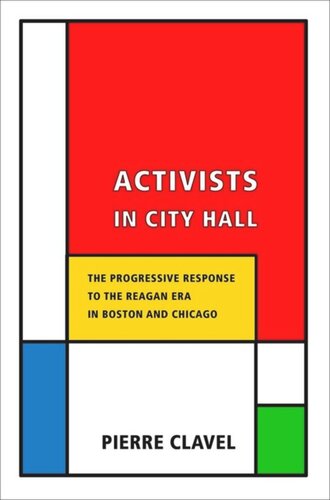

Most ebook files are in PDF format, so you can easily read them using various software such as Foxit Reader or directly on the Google Chrome browser.
Some ebook files are released by publishers in other formats such as .awz, .mobi, .epub, .fb2, etc. You may need to install specific software to read these formats on mobile/PC, such as Calibre.
Please read the tutorial at this link: https://ebookbell.com/faq
We offer FREE conversion to the popular formats you request; however, this may take some time. Therefore, right after payment, please email us, and we will try to provide the service as quickly as possible.
For some exceptional file formats or broken links (if any), please refrain from opening any disputes. Instead, email us first, and we will try to assist within a maximum of 6 hours.
EbookBell Team

4.1
20 reviewsIn 1983, Boston and Chicago elected progressive mayors with deep roots among community activists. Taking office as the Reagan administration was withdrawing federal aid from local governments, Boston's Raymond Flynn and Chicago's Harold Washington implemented major policies that would outlast them. More than reforming governments, they changed the substance of what the government was trying to do: above all, to effect a measure of redistribution of resources to the cities' poor and working classes and away from hollow goals of "growth" as measured by the accumulation of skyscrapers. In Boston, Flynn moderated an office development boom while securing millions of dollars for affordable housing. In Chicago, Washington implemented concrete measures to save manufacturing jobs, against the tide of national policy and trends.Activists in City Hall examines how both mayors achieved their objectives by incorporating neighborhood activists as a new organizational force in devising, debating, implementing, and shaping policy. Based in extensive archival research enriched by details and insights gleaned from hours of interviews with key figures in each administration and each city's activist community, Pierre Clavel argues that key to the success of each mayor were numerous factors: productive contacts between city hall and neighborhood activists, strong social bases for their agendas, administrative innovations, and alternative visions of the city. Comparing the experiences of Boston and Chicago with those of other contemporary progressive cities—Hartford, Berkeley, Madison, Santa Cruz, Santa Monica, Burlington, and San Francisco—Activists in City Hall provides a new account of progressive urban politics during the Reagan era and offers many valuable lessons for policymakers, city planners, and progressive political activists.